Getting Things Done” by David Allen is a must-read for anyone who struggles with productivity, time management, or staying organized. Allen’s system has transformed the way millions approach their daily tasks and long-term goals. In this post, we share some of the most impactful quotes and lessons from the book, along with actionable advice to help you implement these strategies in your own life. Whether you’re a seasoned professional or just starting your productivity journey, these insights will help you take control of your time and reduce stress.
So are you ready? Let’s dive in!
Top Productivity Quotes from the Book Getting Things Done
Unlock your productivity potential with these lessons from the book ‘Getting Things Done’ by David Allen.
1. “Your mind is for having ideas, not holding them.”
David Allen emphasizes the importance of clearing your mind so that it can focus on creating new ideas rather than holding onto mundane tasks or obligations. When your brain is cluttered with to-do lists, appointments, and reminders, your mental energy is drained, leaving less space for creativity and problem-solving.
Start by implementing a trusted system to capture your tasks—whether it’s a notebook, a digital app, or a productivity tool. Offload your mental tasks into this system daily, so your brain is free to focus on the things that truly matter.
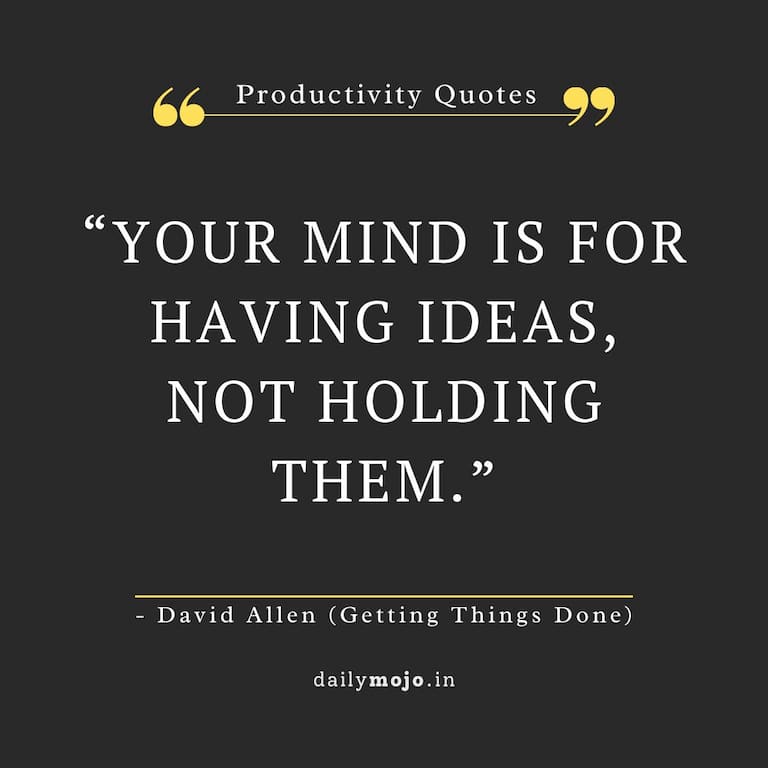
2. “If it’s on your mind, your mind isn’t clear.”
This is another call to action for externalizing your responsibilities. Allen reminds us that when we carry out tasks mentally, it adds unnecessary stress and anxiety. A cluttered mind leads to decision fatigue and impairs your ability to concentrate on the task at hand.
Use the GTD “Inbox” strategy: write down everything that’s on your mind. This step helps you clear your mental clutter and allows you to review, categorize, and prioritize tasks later.
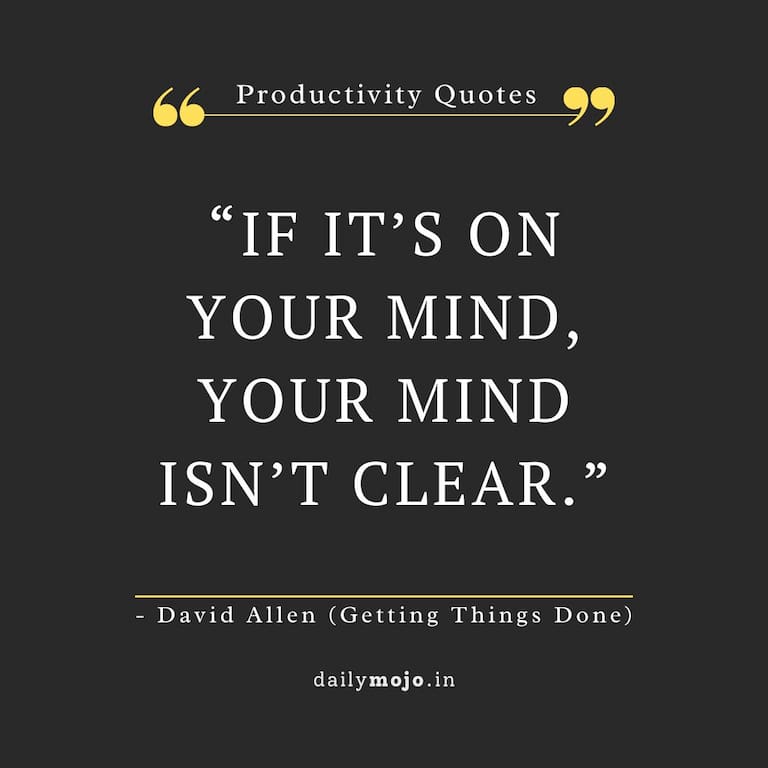
3. “The key to managing commitments is managing your agreements with yourself and others.”
David Allen stresses that the foundation of productivity lies in managing commitments effectively. We make countless promises to ourselves and others every day, often overestimating what we can handle. When we fail to deliver on these promises, it leads to stress and reduced productivity. The key is to ensure that every commitment—whether it’s a small task or a major project—is properly tracked and managed.
Before agreeing to new commitments, assess your existing workload. Use a system (like a calendar or project management app) to track all commitments, and regularly review this list to adjust or renegotiate tasks that you can’t realistically complete. This will help you control your time and energy much more efficiently.
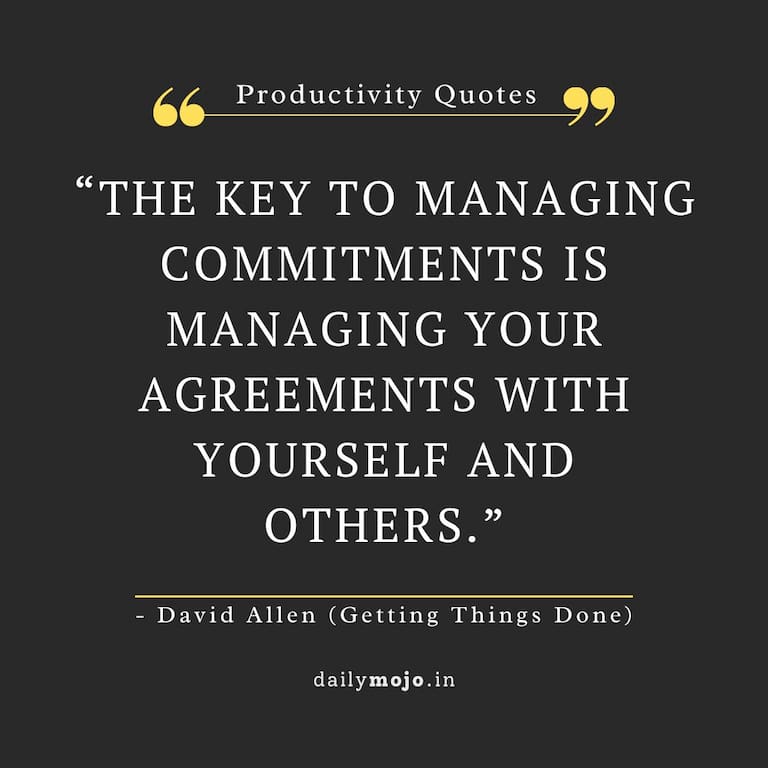
4. “You can only feel good about what you’re not doing when you know what you’re not doing.”
This quote underlines the importance of clarity in task management. Often, stress comes not from doing tasks, but from worrying about what we haven’t done. By having a clear, organized system where you know exactly what needs to be done (and what can be postponed or ignored), you gain peace of mind.
Make a habit of listing all your tasks, projects, and responsibilities. Use a method like the GTD Weekly Review, where you check your lists, calendars, and goals to ensure that you’re aware of what’s pending and what can be deferred. This helps you avoid feeling overwhelmed by uncertainty.
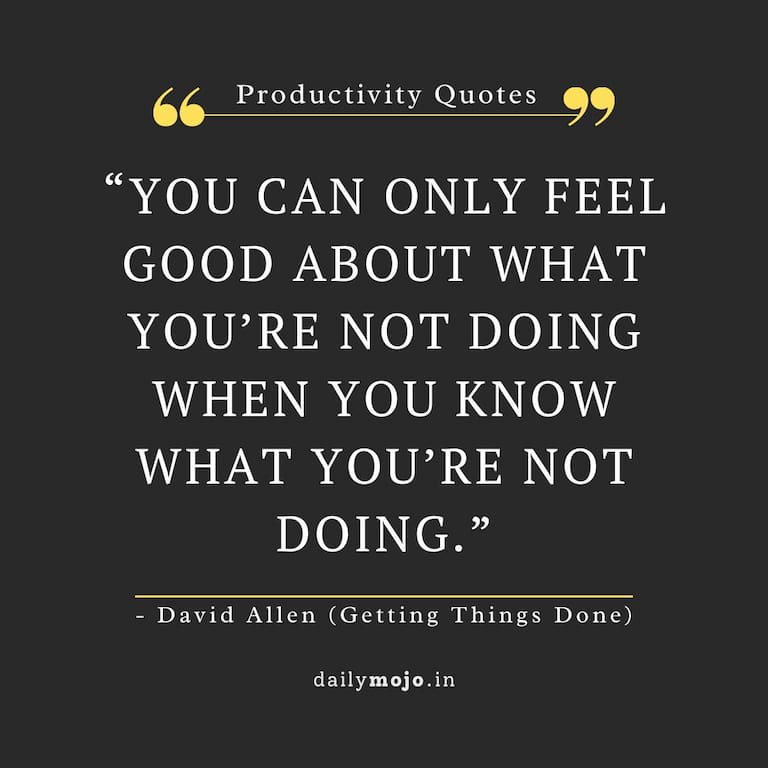
5. “The more you do, the more you can do.”
This lesson echoes the idea of building momentum. When you start completing tasks, even small ones, you create a sense of accomplishment that propels you to tackle bigger and more complex projects. Productivity grows through practice and repetition. The more you engage with your system and get things done, the easier it becomes to stay organized and efficient.
Break your tasks into small, manageable actions and focus on getting started. The satisfaction of completing small actions will build momentum and make larger tasks feel less daunting. Start each day with a “quick win” to set the tone for success.
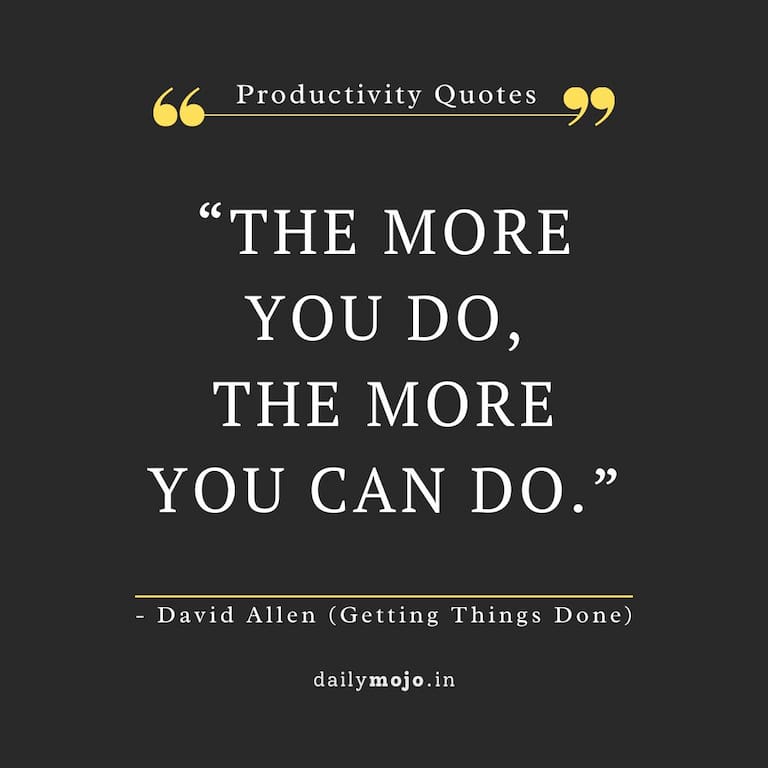
6. “Your ability to generate power is directly proportional to your ability to relax.”
David Allen emphasizes that productivity isn’t about constant action but about balance. High performance requires periods of rest and reflection. Overworking or neglecting time to relax can lead to burnout and reduce your overall productivity. Knowing when to step back is just as important as knowing when to push forward.
Incorporate relaxation and downtime into your productivity system. Schedule regular breaks during your workday and include activities that recharge your energy, like meditation, exercise, or simply taking a walk. Prioritize sleep and relaxation to maintain high energy levels.
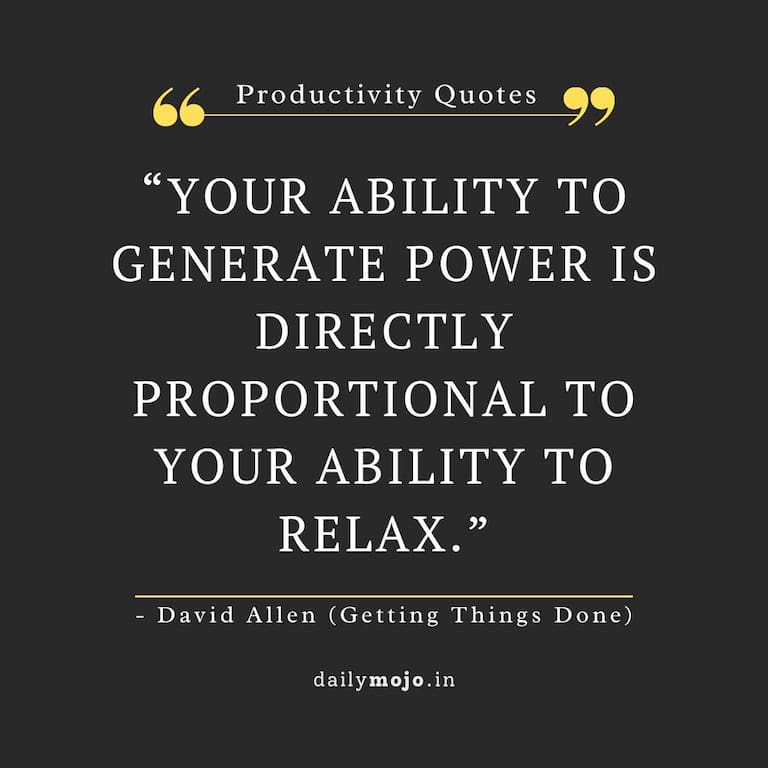
7. “Define your work before you start.”
One of the core principles in Allen’s GTD methodology is to clearly define what “done” looks like before starting a task. Many people waste time because they haven’t clarified what success looks like or haven’t broken down large tasks into actionable steps. When you don’t define your work, it becomes difficult to measure progress, leading to frustration and inefficiency.
Before starting a task or project, ask yourself: What’s the desired outcome? What’s the next action? Break each task into clear, actionable steps. This not only makes tasks more manageable but also helps you stay focused and track your progress.
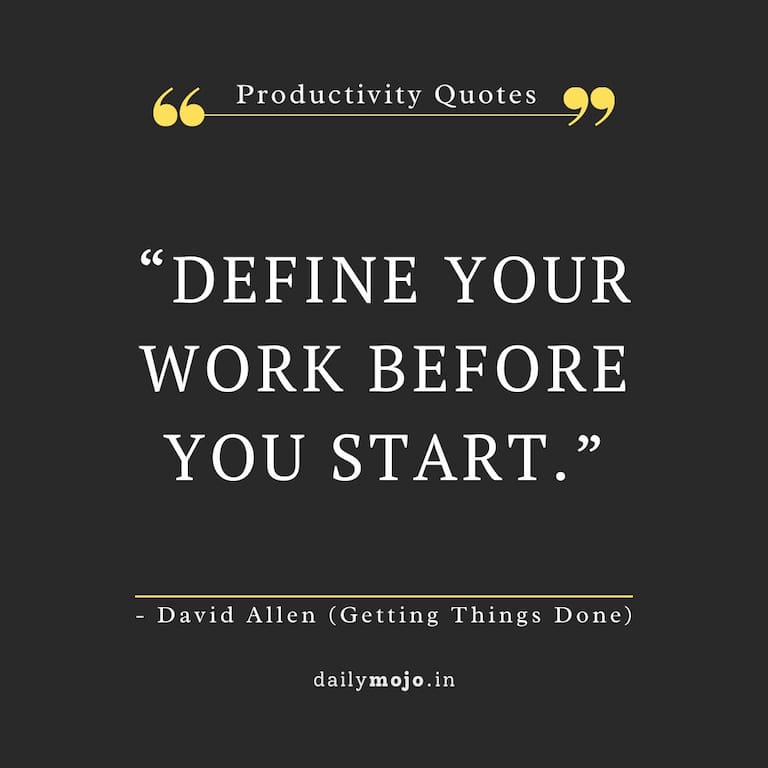
8. “Focus on actions, not results.”
While results are important, David Allen emphasizes that they are a byproduct of consistent action. Focusing too much on the end result can create anxiety and overwhelm, leading to procrastination. Instead, shift your attention to the small, concrete actions you can take today.
When working on a big goal, break it down into daily or weekly actions. Focus on completing those actions, rather than worrying about the final outcome. This approach keeps you motivated and reduces the fear of failure, as you’re always making progress.
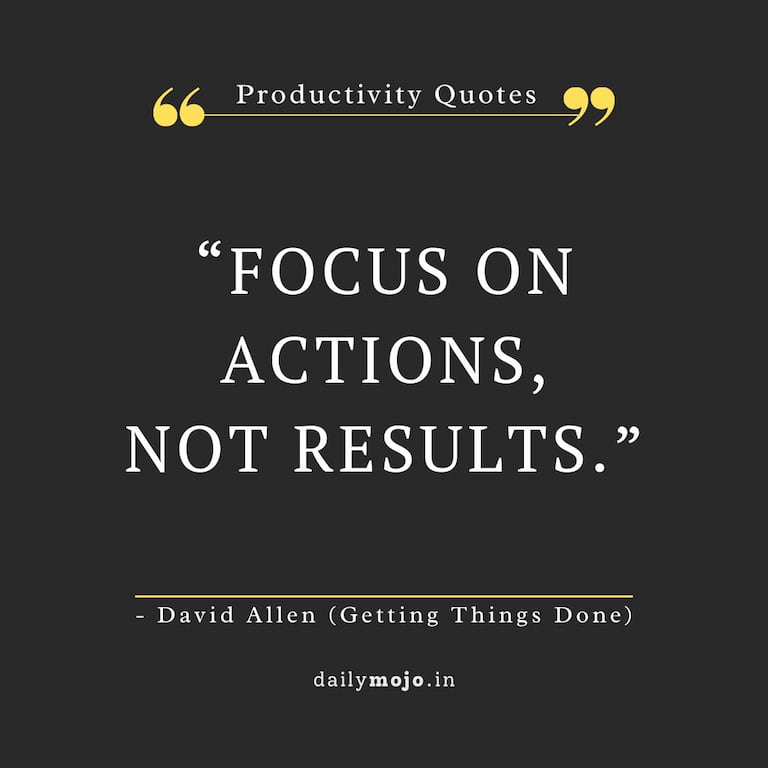
9. “Much of the stress that people feel doesn’t come from having too much to do. It comes from not finishing what they started.”
This quote emphasizes that stress often stems from incomplete tasks rather than an overwhelming number of tasks. Unfinished work lingers in the mind, creating mental clutter and anxiety. By prioritizing and completing tasks, you can reduce stress and regain a sense of control.
Instead of jumping from one task to another, focus on completing what you’ve started. Break large tasks into smaller, actionable steps, and finish them one at a time. This habit will not only boost your productivity but also reduce mental strain and anxiety.
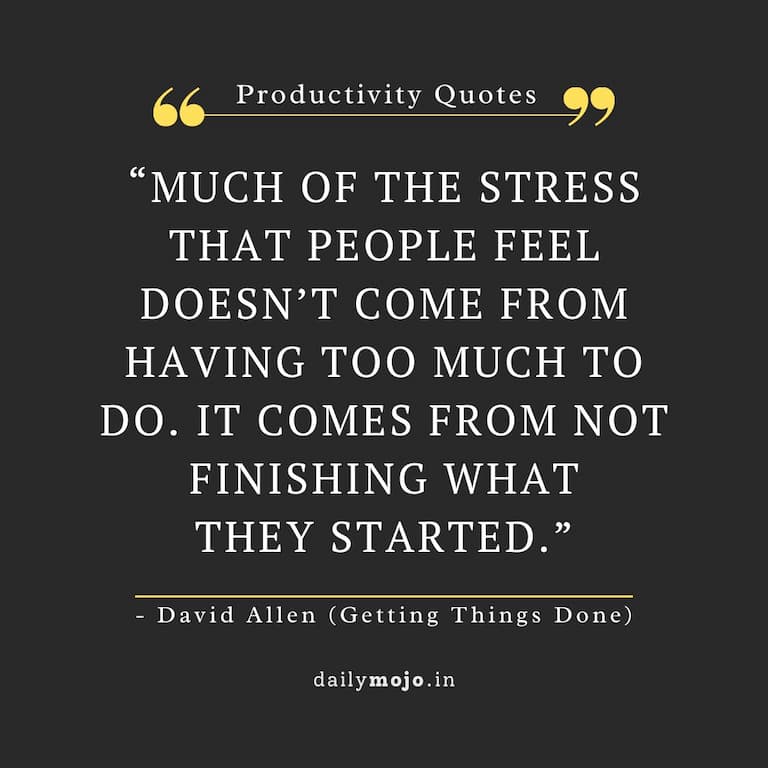
10. “The secret to stress-free productivity is not time management, it’s action management.”
This is perhaps one of the most powerful takeaways from Allen’s work. Many people focus on managing their time, but Allen argues that it’s managing your actions that really drives productivity. It’s not about how many hours you work, but how you use those hours that matters.
Prioritize tasks based on their impact, not just urgency. Use the GTD “Next Action” list to always know what your next step should be. This helps you stay on track and keeps stress levels low because you’re not wasting time figuring out what to do next.
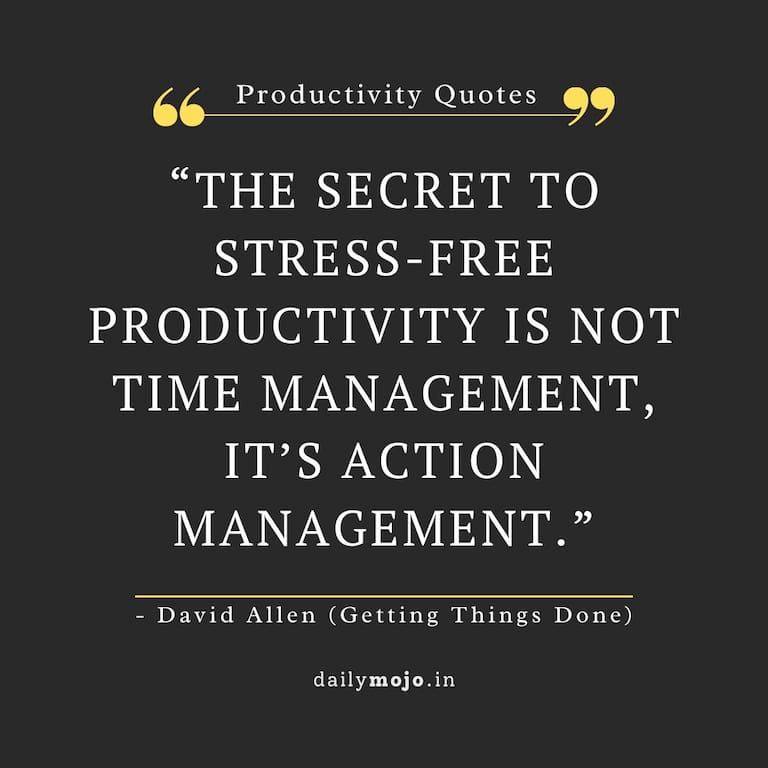
Conclusion
David Allen’s “Getting Things Done” provides a systematic approach to productivity that can drastically reduce stress and help you take control of your work and life.
By implementing even a few of these lessons, you can start achieving more with less effort. Reflect on which lessons resonate most with you and begin applying them today.
As you refine your approach to productivity, don’t forget to share these insights with others who might benefit from these powerful strategies!